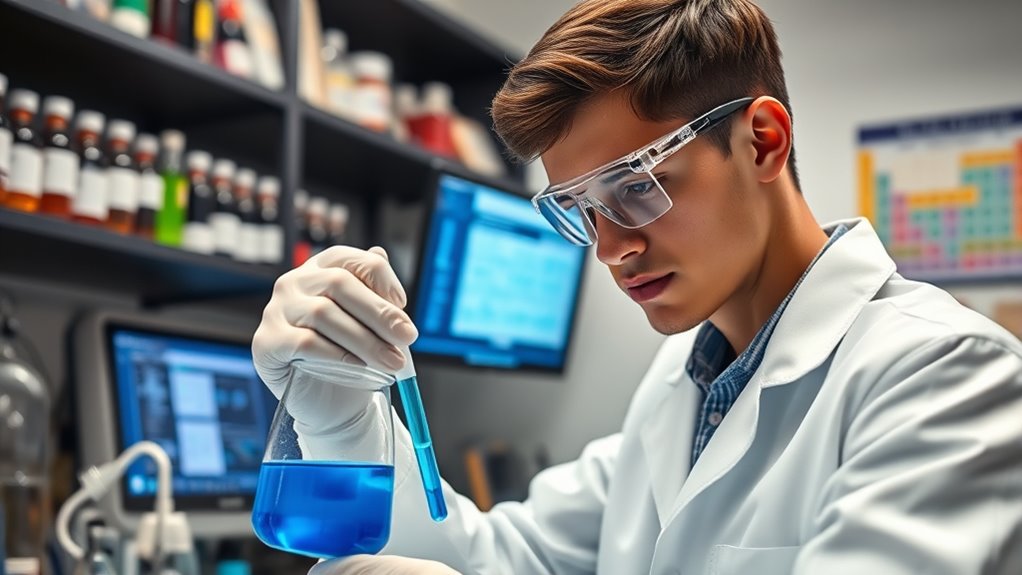Pursuing a PhD in chemistry offers deep expertise, research opportunities, and potential career advancement in academia, industry, or government. It allows you to specialize in areas like materials, biochemistry, or computational chemistry, but demands dedication, patience, and resilience. Challenges include long hours, funding complexities, and balancing work-life needs. Staying organized, building a network, and choosing the right advisor are key for success. If you’re curious about how to navigate this path successfully, explore the detailed strategies below.
Key Takeaways
- A PhD in chemistry opens doors to academia, industry, and government roles but requires significant time, effort, and financial investment.
- Developing specialized research skills and professional networks can enhance career opportunities and personal growth.
- Balancing work-life commitments and managing stress are vital for maintaining well-being during rigorous doctoral studies.
- Securing funding and choosing a research focus aligned with industry trends can boost long-term employability and impact.
- Success depends on proactive planning, effective time management, strong mentorship, and continuous skill development.
Exploring the Range of Specializations in Chemistry PhD Programs

Exploring the range of specializations in chemistry PhD programs reveals a diverse landscape of research areas, each with its unique focus and applications.
You can immerse yourself in analytical chemistry, mastering techniques and instruments for analyzing substances. In inorganic chemistry, you’ll study metals, minerals, and organometallic compounds. Organic chemistry centers on carbon-based molecules and their synthesis, while physical chemistry investigates systems using physics principles.
Theoretical chemistry involves computational models to predict behaviors. You might also explore biochemistry and biological chemistry, focusing on biomolecules, enzymes, and drug development.
Materials chemistry and nanoscience look at nanoscale manipulation and polymers. Computational chemistry uses simulations for reactions and properties. Incorporating market trends into your research choices can help align your specialization with emerging scientific and industrial demands.
Academic and Research Opportunities After Graduation

After earning a PhD in chemistry, you have a variety of academic and research opportunities to pursue. You might aim for a professorship at universities or colleges, where you’ll teach, mentor students, and conduct research. Postdoctoral positions at top institutions offer valuable experience and publication prospects, helping you build your reputation. Academic roles often require defending your dissertation and demonstrating presentation skills, pivotal for securing funding and tenure. You can also engage in interdisciplinary research through university centers, broadening collaboration options. Alternatively, research roles in industry or government labs allow you to work on product development, innovation, or policy support, often demanding project management and teamwork. Skills in experimental design, data analysis, and communication are essential across these paths, opening diverse career possibilities. Furthermore, many of these academic and research roles provide opportunities for funding your research projects through grants and collaborations, which can help advance your scientific contributions and professional reputation. Developing expertise in research funding acquisition is crucial for sustaining and expanding your projects over time.
The Structure of a Typical Chemistry PhD Program

A typical chemistry PhD program spans approximately four to six years, with the first two years primarily focused on completing coursework. You’ll earn 54–72 credits, depending on your institution, including core courses in analytical, organic, or physical chemistry, plus specialized electives like nanomaterials or bioinformatics. Many programs also include interdisciplinary coursework to prepare students for diverse research areas. You’ll participate in seminars, earning 1–5 credits for research presentations. During later years, you’ll take 6–10 dissertation credits per semester. You’ll face milestones like exhaustive exams, usually by your fourth semester, and a final dissertation defense. Throughout, you’ll present at departmental seminars and undergo annual progress reviews. Fundamental coursework requires at least one graduate course in each major chemistry discipline, with interdisciplinary options available. Lab rotations and teaching duties will also be part of your journey. Additionally, gaining experience in research methodology is crucial for developing the skills necessary to succeed in independent research.
Gaining Practical Research Experience During Your Studies

While completing coursework and passing milestones are important steps in your chemistry PhD journey, gaining hands-on research experience truly brings your learning to life. Participating in industrial internships at companies like Merck or Bayer gives you real-world insight and strengthens your resume.
Collaborative projects with faculty enhance your lab skills and critical thinking, while working with advanced technology broadens your research capabilities. These experiences also help you build professional networks in academia and industry, opening doors for future opportunities.
You’ll learn essential experimental techniques, develop problem-solving and critical-thinking skills, and improve your time management. Practical research prepares you for industry roles, making you more attractive to employers and increasing your chances of securing research positions after graduation. Additionally, understanding the support hours of various entertainment venues can help you plan your leisure time effectively.
Developing Key Personal Skills Through a PhD Journey

Beginning a PhD in chemistry offers more than just technical expertise; it’s a transformative journey that helps you develop essential personal skills. You’ll sharpen your analytical and critical thinking by analyzing complex data, designing experiments, and evaluating scientific literature. Understanding chemical formulas and processes allows you to interpret results more accurately and develop innovative solutions. Problem-solving becomes second nature as you troubleshoot procedures and interpret results, strengthening your logical reasoning. Your communication skills will improve through regular presentations, writing papers, and collaborating with diverse teams, making you an effective scientist and communicator. Leadership and teamwork are cultivated as you lead projects, mentor juniors, and manage collaborations. Time management and organization are *vital* for balancing experiments and deadlines, boosting your prioritization and multitasking abilities. Developing strong project management skills further enhances your ability to plan, execute, and complete research efficiently. Ultimately, resilience and self-motivation grow as you overcome setbacks and stay committed to your research goals.
Financial Aspects and Funding Options for Chemistry PhD Students

Pursuing a chemistry PhD typically comes with extensive financial support that covers tuition and living expenses, making it more accessible than many other graduate programs. Most students receive funding through teaching or research assistantships, which provide a stipend and health benefits. These packages often include tuition remission, a living stipend, and health insurance, usually guaranteed for at least five years if you stay in good academic standing. These funding packages are often negotiable and may vary depending on the institution and department. Stipends generally range from mid-$20,000s to around $30,000 annually but can be less adequate in high-cost areas. External fellowships, like those from the NSF, can boost your funding and reputation. Keep in mind, taxes, health costs, and local living expenses impact your financial stability. Early applications and applying for fellowships improve your chances of securing sufficient funding. Funding levels and sources vary widely across programs and regions, so researching specific programs’ support structures is crucial.
Selecting the Right Research Focus and Advisor

Choosing the right research focus and advisor is essential for your success in a chemistry PhD program. You should pick a research area aligned with your long-term goals, whether in industry or academia, and consider its relevance to global challenges like sustainability.
Look for interdisciplinary fields such as computational chemistry or materials science that broaden impact and collaboration. Verify your focus aligns with available funding in areas like energy storage or drug discovery, and matches industry demand in fields like pharmaceuticals or polymers. Incorporating specialized knowledge into your research can also enhance your expertise and marketability.
When selecting an advisor, review their publication record, mentorship style, and funding history. An advisor’s network and alumni success also indicate strong support for your career.
Ultimately, choose a focus and mentor that complement your skills and ambitions for a rewarding research experience.
Building a Professional Network in the Scientific Community

Building a strong professional network in the scientific community is essential for advancing your research career. Attending conferences and events lets you connect with researchers at all stages, participate in Q&A sessions, and join informal gatherings. Workshops and seminars offer smaller settings for detailed discussions and presentations, while sharing your research within your group fosters internal support. Publishing in journals and writing accessible science content increases your visibility and attracts collaboration opportunities. Engaging in online communities and social media groups broadens your reach beyond geographical limits. Cultivating relationships with mentors and peers offers guidance, support, and potential joint projects. Additionally, leveraging local and institutional networks by participating in seminars and collaborating with colleagues helps build a strong foundation for your professional growth. Recognizing the importance of vetting sources and information ensures the credibility of your research and enhances your professional reputation.
Managing Challenges and Maintaining Well-being in a PhD Program

Managing challenges and maintaining well-being during a PhD program are vital for sustained success and personal health. Financial stress can be significant, especially if funding fluctuates or costs rise faster than your income. Balancing work and personal life is essential; setting boundaries helps prevent burnout.
Regular exercise, healthy eating, and peer support can ease stress. The competitive academic environment demands continuous problem-solving and collaboration, which can be taxing but rewarding. Engaging with anime movies and animated films that touch hearts can offer a creative outlet and mental refreshment during demanding times.
Prioritize your mental health by recognizing signs of burnout and utilizing university resources. Take breaks and practice self-care to stay resilient.
Staying adaptable to technological and industry changes ensures your skills remain relevant. Managing these challenges proactively keeps you motivated, healthy, and better equipped to complete your PhD.
Tips for Preparing and Excelling in Your Chemistry Doctorate

Preparing for your chemistry doctorate requires more than just passion; it demands strategic planning and skill development. Build a strong foundation in core chemistry areas like organic, inorganic, physical, analytical, and biochemistry before starting. Take advanced courses in math, statistics, or computer science to support your research. Regularly practice solving complex problems and develop technical skills in data analysis, molecular modeling, and database management. Conduct independent research projects to hone your planning skills and master literature reviews to identify research gaps. Communicate proactively with your advisor and committee, seeking feedback early and often. Manage your time effectively by setting milestones, prioritizing tasks, and balancing lab work with coursework. Engage in conferences, publish your work, and seek industry collaborations to boost your readiness and excel during your PhD journey. Additionally, developing proficiency with specialized tools and materials, such as those used in unique and wicked planters, can give you an edge in experimental design and innovation.
Frequently Asked Questions
What Are the Typical Career Paths Available With a Phd in Chemistry?
With a PhD in chemistry, you can pursue diverse careers. You might become a postsecondary teacher, research scientist, or university faculty, leading projects and securing funding.
Industry options include R&D roles in pharmaceuticals, chemicals, or environmental science. You could also work in forensic science, agricultural research, or specialize in analytical techniques.
Nontraditional paths include patent law, scientific communication, or entrepreneurship. Your advanced skills open many doors across academia, industry, government, and beyond.
How Competitive Is Admission to Top Chemistry Phd Programs?
Admission to top chemistry PhD programs is extremely competitive. You’re up against highly qualified applicants, with acceptance rates often below 10%. Programs seek candidates with strong research backgrounds, excellent recommendation letters, and aligned research interests.
International applicants face additional hurdles like funding and visa issues. To improve your chances, focus on building research experience, securing solid recommendations, and applying to programs that match your interests and qualifications.
What Are the Common Challenges Faced During a Chemistry Phd?
During your chemistry PhD, you’ll face several common challenges. High expectations and rigorous coursework can overwhelm you, while slow research progress might lead to frustration.
Balancing research, coursework, and deadlines adds stress, and the pressure to publish can be intimidating.
You may also experience feelings of loneliness, anxiety, and self-doubt.
Financial worries, limited job prospects, and the need to develop new skills further complicate your journey.
How Long Does It Usually Take to Complete a Chemistry Phd?
Did you know the average chemistry PhD takes about 5 to 5.5 years to finish? You’ll spend the first couple of years on coursework and exams, then shift focus to research and dissertation writing.
Your progress depends on research complexity, publications, and institutional requirements. Expect some students to finish in four years, but it’s common for others to take up to six.
Staying consistent and planning ahead helps you stay on track.
What Are the Key Skills Employers Look for in Phd Chemistry Graduates?
You should know that employers look for strong analytical skills, like advanced laboratory techniques and data interpretation. They value your problem-solving abilities and innovative thinking, especially in complex experiments.
Project management and organizational skills also matter, ensuring you can handle multiple tasks and timelines.
Plus, clear communication—whether through reports, presentations, or teamwork—is essential. Demonstrating these skills shows you’re capable of contributing effectively in research or industry roles.
Conclusion
Pursuing a chemistry PhD is like steering through a complex yet rewarding labyrinth—each twist and turn sharpens your mind and broadens your horizon. With dedication, you’ll forge a path filled with discovery and growth, transforming challenges into stepping stones. Remember, your journey is uniquely yours, and every experiment and late night brings you closer to revealing the secrets of the universe. Embrace the process, and let your passion be the compass guiding you to success.









